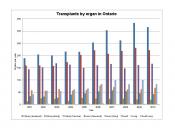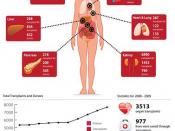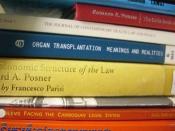Organ transplantation has been recognized as one of the biggest medical advances of the century as it provides a way of donating organs from deceased or living individuals to the patients with terminal failure of vital organs. Advances in medical technology and science have made transfer of organs and tissue a very important issue. The increasing incidence of vital organ failure and the inadequate supply of organs, especially from cadavers, has created a wide gap between organ supply and organ demand, which has resulted in very long waiting times to receive an organ as well as an increasing number of deaths while waiting (Caplan, 1998). These events have raised many ethical, moral and societal issues regarding supply and organ allocation, xenotransplantation, the risks and benefits of organ donation from living donors, the issues dealing with organ donation from the deceased, and the duties and responsibilities of the medical profession and society to help those who need help.
The shortage of human organs is causing on of the biggest ethical issues in organ transplantation. Even though, transplantation centers would like to transplant all patients who need new the organs, unfortunately, there are not enough living or cadaver donors available to help as many patients as need it. It has also led to the practice of organ sale by entrepreneurs for financial gains in some parts of the world through exploitation of the poor, for the benefit of the wealthy (Pattinson, 2003). In general, in US recipients of organs are chosen from a waiting list after they have been medically determined to be qualified candidate. All potential patients for organ transplant surgery have to be evaluated and tested to be qualified. Organ allocation aims for a satisfactory outcome measured by patient survival and quality of life. Moreover, allocation considers patients waiting time...


